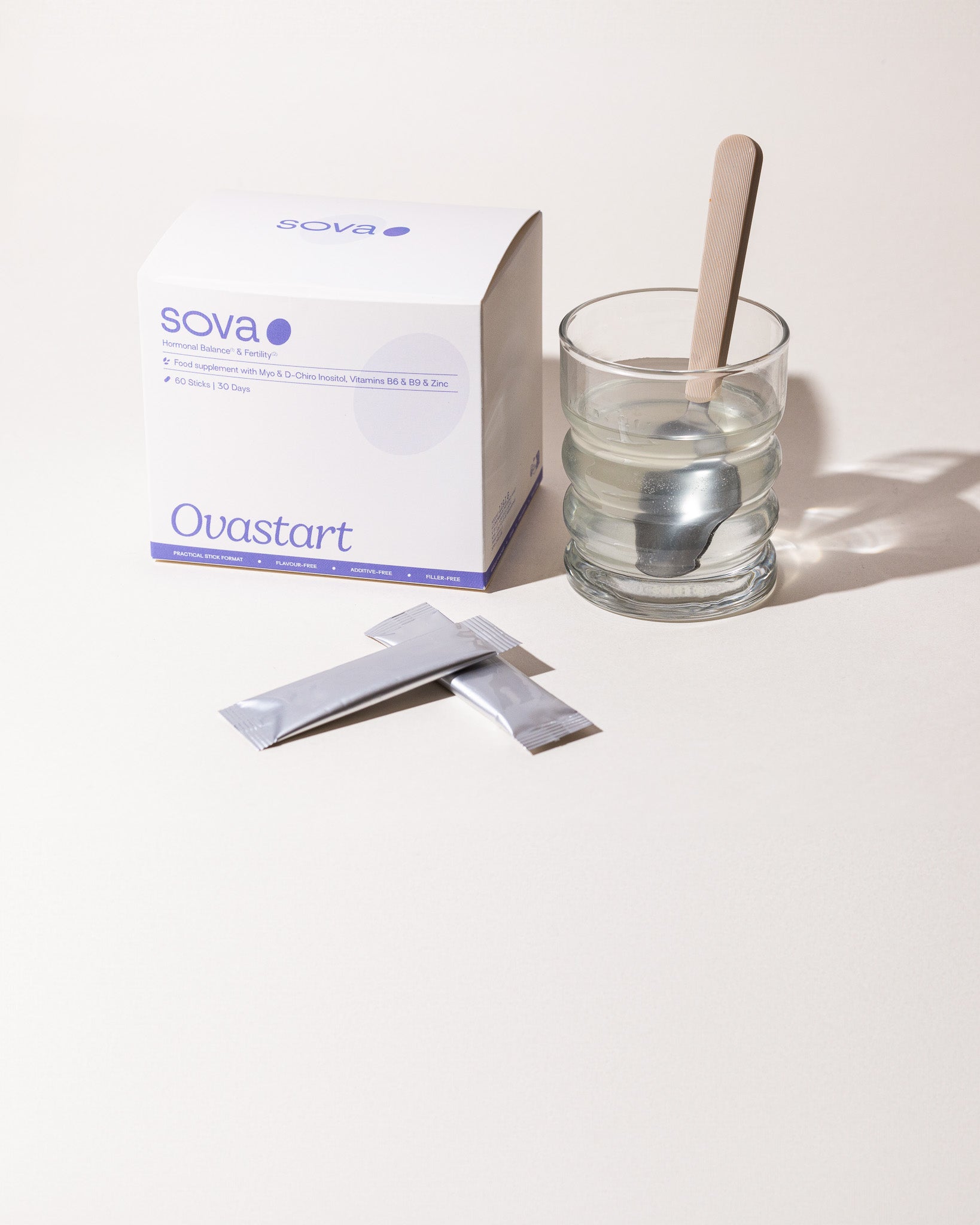Table of contents
- 01. What is intermittent fasting?
- 02. What are the benefits of intermittent fasting?
- 03. What are the risks of intermittent fasting?
- 04. Is intermittent fasting beneficial for PCOS?
- 05. How can you safely practice intermittent fasting with PCOS?
- 06. Conclusion : Is intermittent fasting relevant for PCOS?
Everyone has heard of the well-known "intermittent fasting", a trend that's become quite popular in the world of nutrition, often promising weight loss.
It's increasingly touted as a miracle solution. Some even claim that you can do it simply by skipping breakfast and, voilà, lose weight! Tempting, isn't it? Is that for real? Is it truly a sustainable weight loss strategy? And could it be a beneficial ally for women with PCOS? If you've ever wondered about it then this article is for you!
As we've discussed previously, diet plays a crucial role in managing polycystic ovary syndrome (PCOS). It can help alleviate various symptoms (acne, weight gain, hirsutism, hair loss, infertility, etc.) and reduce associated risks (type 2 diabetes, cardiovascular diseases, and certain cancers).
Moreover, it can combat insulin resistance, which is prevalent in the majority of women with PCOS.
For the basics of a PCOS-friendly diet, check out our article on the key nutrition rules for your type of PCOS.
💡 If you're unsure which dietary approach and supplements are right for you, take our free product quiz to get personalised recommendations based on your symptoms.
So, is intermittent fasting a good approach to help manage your PCOS?
- A reminder about insulin resistance: when you eat food containing carbohydrates (bread, pasta, rice, fruit, sweets, etc.), your blood sugar levels rise. To lower it, your pancreas secretes a hormone called insulin. Insulin is known as a "hypoglycaemic" hormone. If you're insulin resistant, insulin struggles to enter your cells and carry away excess blood sugar. Thus, your blood sugar levels remain high. With persistent high blood sugar, the pancreas continues to produce insulin. This results in excess insulin in the blood. This state of affairs encourages the secretion of androgens, inflammation, and weight gain.
What is intermittent fasting?
According to CERIN, the Centre for Nutritional Information and Resources, intermittent fasting involves a complete cessation of intake of macronutrients (carbohydrates, fats, proteins) and micronutrients (vitamins and minerals except for those found in beverages), without restricting hydration, for a duration ranging from several hours to several days.
In practice, there are primarily three types of intermittent fasting:
- Alternate-day fasting: alternating between unrestricted eating days and fasting days.
- Modified fasting: also known as 5:2 fasting (5 days of normal eating followed by 2 days of intermittent fasting). This involves not eating for several hours, for example, from the evening before until dinner the following day. It allows daily eating but with a calorie restriction of about 25% compared to a normal day.
- Fasting: concentrating all nutritional intake within a single period of the day.
Fasting is the most widespread form of intermittent fasting. Different eating windows are possible, notably the 16/8 fast, which allows eating within an 8-hour window. You’ve likely heard of this—it's the famous fast that often involves skipping breakfast. One fasts from dinner until lunch the next day.
There are also other, less common forms, such as the 18/6 fast, which allows a 6-hour eating window, or the 20/4 fast, with just a 4-hour consumption window!

What are the benefits of intermittent fasting?
Before discussing the potential benefits of intermittent fasting, it's important to note that the available studies are mostly short-term with small sample sizes. Many studies have been conducted on animals, with fewer on humans, and even fewer on women with hormonal imbalances. Thus, larger-scale studies are needed to confirm the various benefits discussed below.
In scientific literature, some studies suggest benefits to intermittent fasting, particularly for those who are overweight, obese, or diabetic. These benefits include:
- Improved cognitive function and better concentration
- Weight loss and reduced body fat (though not more significant than basic energy restriction)
- Reduced blood pressure
- Improved sleep
- Lower glycated haemoglobin (reflecting blood sugar levels over 2 to 3 months)
- Reduced inflammation
- Reduced insulin resistance
- Lower androgen hormones (and this applies even to men!)
Some studies suggest that benefits related to blood sugar levels (such as reduced glycated haemoglobin and insulin resistance) may only occur when consumption windows are earlier in the day—so the 16/8 fast that skips breakfast might not be ideal!
💡 If improving insulin sensitivity is your main goal, supplements like Sugar Balance (with berberine, chromium, and zinc) can be a helpful addition to your routine—whether or not you try intermittent fasting.
What are the risks of intermittent fasting?
While we’ve seen that some studies indicate potential benefits of intermittent fasting, there are also risks to consider, including:
- Hormonal disruption, particularly involving oestrogen and cortisol (the stress hormone). Skipping a meal, especially breakfast, triggers cortisol production, which competes with progesterone, leading to a decrease in the latter. This can result in oestrogen dominance, potentially causing symptoms like water retention, headaches, blood circulation issues, heavier periods, and more.
- Increased risk of eating disorders due to frustrations caused by fasting
- Greater risk of nutrient deficiencies due to potentially restrictive and unbalanced diets
- Increased insulin resistance if meals during the consumption window are too large and carbohydrate-rich
- Increased fatigue due to potential deficiencies
Additionally, this type of fasting is not recommended if you fall into one of the following categories:
- Planning for a baby, undergoing fertility treatment
- Pregnant
- Breastfeeding
- History of eating disorders
- Chronic fatigue
- During menstruation

Is intermittent fasting beneficial for PCOS?
At first glance, the aforementioned benefits might seem appealing if you have PCOS. Indeed, intermittent fasting could help reduce insulin resistance, lower androgen hormones, combat inflammation, and support weight loss.
Given that tackling insulin resistance is crucial in managing PCOS—since it promotes androgen secretion, inflammation, and weight gain—it's a vicious cycle…
However, it’s important to remember that intermittent fasting can trigger eating disorders, which already pose a heightened risk for women with PCOS! Not to mention the added mental strain.
If done incorrectly, it can also increase insulin resistance, lead to deficiencies, disrupt hormones like oestrogen and cortisol, and cause fatigue, headaches, etc. So, it’s not without risks to your health!
How can you safely practice intermittent fasting with PCOS?
If you have PCOS and are considering intermittent fasting, a few key tips are essential:
- Seek guidance from a doctor or dietitian. Never embark on this type of fasting alone—this is very important!
- Use your sleep time for fasting: for instance, have dinner early (around 6/7 pm) and fast until breakfast, without exceeding 12 hours of fasting. This allows you to fast without skipping meals, minimising some of the risks we've discussed.
- Adapt your diet to your PCOS during your eating window. Maintaining a balanced diet tailored to your condition is crucial to avoid further hormonal imbalances and deficiencies.
Remember, intermittent fasting is not recommended during menstruation, while planning for a baby, during pregnancy, breastfeeding, or if you have a history of eating disorders.
If you start fasting and notice changes in your mood, experience cravings, frustrations, or symptoms like headaches or water retention, it may not be for you. There are too few studies on intermittent fasting concerning hormonal imbalances like PCOS, so I’d advise not to take unnecessary risks.
📌 For a complete approach to PCOS, many women combine a tailored diet with targeted supplements like Ovastart for hormonal balance and our Balance Bundle for both hormonal and metabolic support.
Conclusion : Is intermittent fasting relevant for PCOS?
Given the lack of studies on intermittent fasting, particularly in relation to PCOS, it's difficult to definitively say that it's a viable strategy. PCOS is a hormonal disorder, and this type of fasting carries certain risks that could worsen your symptoms.
If you’re considering it, always do so under professional supervision—and remember, there are other effective, safer ways to address insulin resistance and PCOS symptoms, starting with a balanced diet, the right supplements, and tools like our PCOS product quiz to guide your choices.
SOVA was created by two sisters with PCOS who wanted products that truly worked. Our formulas are developed in-house with women’s health and micronutrition experts, using ingredients backed by clinical studies and compliant with European regulations.
- Built by women with PCOS, we know the reality of the symptoms.
- Clinically studied, high-quality ingredients, including patented forms like Quatrefolic® and an optimal Myo-/D-Chiro Inositol ratio.
- Holistic support for hormonal balance, metabolic health, inflammation, mood and cycle regulation.
- Transparent, science-led formulas with no unnecessary additives.

















